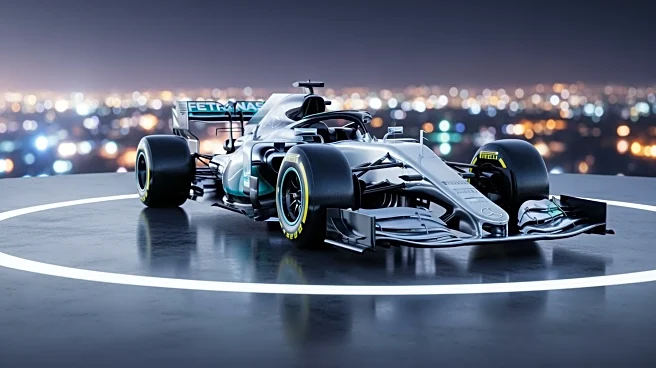What's Happening?
Andrea Kimi Antonelli, a promising young driver for Mercedes, showcased his potential in Formula 1 by securing a second-place finish at the Sao Paulo Grand Prix. This marks his second podium finish and the best result of his rookie season. Antonelli managed
to fend off Max Verstappen, who had a tire advantage, in a close finish. His performance at Interlagos was noted for its consistency, as he qualified and finished second in both the sprint and the main race. Mercedes team principal Toto Wolff praised Antonelli's ability to handle pressure and perform well on a track unfamiliar to him, highlighting the Italian teenager's growth and potential in the sport.
Why It's Important?
Antonelli's performance is significant for Mercedes as they look to the future of their F1 team. With Lewis Hamilton's move to Ferrari, Antonelli's development is crucial for maintaining the team's competitive edge. His ability to compete with seasoned drivers like Verstappen suggests a promising trajectory for Mercedes in upcoming seasons. This development also adds a new dynamic to the F1 landscape, as young drivers like Antonelli begin to challenge established figures, potentially reshaping team strategies and rivalries. For Mercedes, nurturing Antonelli's talent could be key to sustaining their success in the sport.
What's Next?
Looking ahead, Antonelli's performance sets high expectations for the remaining races of the season and beyond. Mercedes will likely focus on further developing his skills and managing the pressures of high-stakes competition. As the F1 season progresses, Antonelli's ability to consistently perform will be closely watched by fans and analysts. His next challenge will be the Las Vegas Grand Prix, where he will aim to build on his recent success. The team's strategy will likely involve balancing immediate race performance with long-term development goals for Antonelli.
Beyond the Headlines
Antonelli's rise in F1 highlights broader themes of youth and innovation in the sport. His success underscores the importance of nurturing young talent and adapting to new competitive dynamics. This shift may influence how teams approach driver development and talent scouting, potentially leading to a more diverse and dynamic field of competitors. Additionally, Antonelli's journey reflects the pressures young athletes face in high-profile sports, emphasizing the need for supportive team environments and effective mentorship.

















